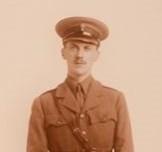
|
The King's School Canterbury |
Roll of Honour |
| Lieutenant Basil George Hope MACLEAR MC | |
|
Number 2 Company, 4th Battalion Grenadier Guards Date of birth: 11th October 1885 Date of death: 26th July 1916 Killed in action aged 30 Buried at Essex Farm Cemetery Plot II Row Z Grave 19 |

|
| He was born in Canterbury on the 11th of October 1885 the second son of the Reverend Canon George Frederick Maclear DD, Clerk in Holy Orders and Warden of The Lodge, St Augustine's College Canterbury, and Eva Jemima (nee Purcell) of The Lodge, Canterbury. He was christened at St Paul's Church, Canterbury on the 24th of December 1895. He attended the King's School Canterbury from January 1899 to October 1902. He went on to University College Reading from 1903 to 1904 and later that year he moved to South Africa where he purchased a fruit farm at Plaisa De Merle, Simondium in Cape Province. He was admitted as an Associate of University College Reading in 1905. In September 1915 he returned to England to enlist and boarded the SS "Kildonan Castle" at Durban, landing at London on the 17th of September 1915. On the 24th of September 1915 he applied for a commission in the Special Reserve of Officers for the Grenadier Guards while he was staying at the Regent Palace Hotel, Piccadilly. On the 5th of October 1915 he was commissioned as a probationary 2nd Lieutenant in the Grenadier Guards and received orders on the 15th of October to join the regiment at Buckingham Gate with immediate effect. He was promoted to Lieutenant on the 26th of January 1916. He embarked for France on the 16th of December 1915 where he joined the 4th Battalion of his regiment. On the 24th of March 1916 he rendered a report of a patrol he had undertaken that night and as a result of the information it contained he led a further reconnaissance patrol the following night which, if successful, would result in a bombing attack on the enemy trenches at a later date. In the event the patrol was seen by the enemy and a fierce fire fight broke out which meant that, with all surprise lost, future plans for a raid were abandoned. On the 19th of April 1916 the Germans occupied the village of Wieltje in front of the 2nd Battalion Scots Guards who were holding the line in front of the village but only thinly. The Germans then attacked and captured six hundred yards of British trenches and then began bombing their way up towards the Scots Guards. Basil Maclear was sent forward and put in charge of a strong patrol to assist the Scots and, in spite of the German grenades which "rained" down on the group, they were successful in clearing the enemy from the positions and taking one enemy soldier as a prisoner. For his part in this action Basil Maclear was awarded the Military Cross. The citation appeared in the London Gazette of 31st of May 1916: - "For conspicuous gallantry and ability. When ordered to establish communication with another battalion, he did so over 250 yards of ground in the face of very heavy shell fire, establishing bombing posts as he proceeded." At 1.10am on the 26th of July 1916 a party of enemy troops raided front line trenches held by No. 2 Company near Ypres. Some half a dozen of the enemy jumped over the parapet and bombed a working party who were taken completely by surprise. Basil Maclear, hearing the noise, rushed to the spot and was killed instantly by a bomb thrown at close range. Further reinforcements rushed to the spot and ejected the raiders, who escaped and disappeared into the darkness. His sister, Eva Mary Gertrude Maclear, received the following telegram dated the 29th of July 1916: - "Deeply regret to inform you that 2nd Lieut. B.G.H. Maclear 4th Grenadier Guards was killed in action July 25th (sic). The Army Council express their sympathy." The battalion war diary recorded: - "The loss of 2/Lt Maclear, who was awarded the Military Cross for gallantry on the night of April 19th/20th, will be very greatly felt by all ranks. He was absolutely fearless and self reliant." His brother, Lieutenant Geoffrey D'Olier Maclear MC (OKS) 2nd Battalion 39th Garhwal Rifles, died on the 29th of January 1919. He is commemorated on the war memorial at University College Reading. |
|
Back